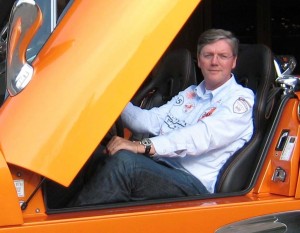“I’m a reborn man,” proclaims Victor Muller, as he wanders the PALExpo Convention Center during the first press day at the 2012 Geneva Motor Show.
A year ago, the Dutch entrepreneur was at the annual event pulling the covers off the Saab Phoenix concept car – and hoping to line up financial support to keep that struggling Swedish carmaker in business. Now Saab is dead, Muller severing all ties and turning it over to the bankruptcy courts.
But while some folks might have taken that as a cue to vanish from the automotive headlights, not Muller, who could be found drifting through the sprawling conference center saying hello to old friends and giving TheDetroitBureau.com the inside scoop on life post-Saab.
The most significant news? The ever-upbeat Muller has decided to scrub plans to sell off his other automotive company, the Dutch-based Spyker Cars.
“I’m excited to get back into this business,” he says, explaining that he has largely worked through the “huge liabilities” he incurred during what he calls “the Saab era.”
Muller says that while he was unable to raise the money needed to save floundering Saab – which was hammered by a supplier boycott that began a year ago and ultimately pushed the company into liquidation – “cash is now coming back into” Spyker.
That company was named after a once-proud Dutch firm that itself collapsed prior to the Great Depression. It has been selling a series of exotic, largely hand-built sports cars, though its own operations were effectively put on hold during the Saab crisis.
At one point, Muller considered selling Spyker to his former Russian business partner, Vladimir Antonov. Now the oligarch is “out of the picture” entirely, he says with a clear smile.
If anything, Muller hopes to expand sales of the Spyker line, which has never produced more than 100 vehicles a year.
As for Saab? He vaguely hints that there still could be life after death. News reports indicate several potential buyers continue to negotiate with the Swedish courts for rights to the name and assets. The problem, he admits, is that former Saab parent General Motors will apparently never approve sale of the 9-5 and 9-4X models, which use the U.S. maker’s intellectual property. But there is the old 9-3, as well as a new version that Muller’s Swedish Automobile company, or SWAN, wasn’t able to put into production.
And there’s also the Phoenix concept, penned by widely respected automotive freelance designer Jason Castriota.
But that’s someone else’s challenge now, Muller sighs – a disappointment, no doubt, but one he is clearly happy to be freed of.
“I’m extremely happy,” he says, to not be working the 20-hour days, seven days a week, trying to line up a deal to save the Swedish company he bought in early 2010.
But he’s also happy to still have a foot in the automotive door. Even after the problems he’s faced over the last two years, it has clearly become an addiction.

